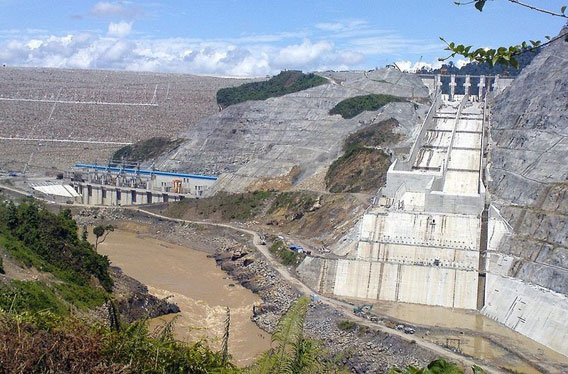
Bakun dam during construction. Photo by: Mohamad Shoox.
The world’s third largest mining company, Rio Tinto, and a local financial and construction firm, Cahya Mata Sarawak (CMS), have cancelled plans for a $2 billion aluminum smelter to be constructed in the Malaysian state of Sarawak. The cancellation calls into question Sarawak’s plan to build a dozen massive dams—known as the Sarawak Corridor of Renewable Energy (SCORE) initiative—that were proposed, in part, to provide power to the massive aluminum smelter. However, the mega-dam proposal has been heavily criticized for its impact on Sarawak’s rivers, rainforest and indigenous people.
Rio Tinto and CMS stated that the project had been dropped because power supply terms could not be agreed on. The smelter would have produced 1.5 million tons of aluminum annually. According to Jacynthe Cote, chief executive of Rio Tinto’s Alcan aluminum division, there were no hard feelings over the cancellation.
“Looking into the future, we remain interested in development opportunities that may arise within the state and the country,” he said.
Beyond the internal decisions, the cancellation immediately puts Sarawak’s dam building plans under new scrutiny. After long delays and cost overruns, one of the dozen dams has already been completed, the 2,400 megawatt Bakun dam. The dam reportedly displaced around 10,000 indigenous people and flooded 70,000 hectares of rainforest (about the size of Singapore). By itself, the Bakun dam produces twice as much power as the entire state of Sarawak. Despite this, a second dam, the 900 megawatt Murum dam, is currently under construction.
Sarawak’s government, under Abdul Taib Mahmud or “Taib”, has been aggressively pushing implementation of the SCORE plan and fending off criticism, stating that the state would need the additional power for the Rio Tinto-CMS smelter.
“Rio Tinto’s decision [to cancel the smelter] proves that the Taib government’s irresponsible economic policies have completely failed. There is no need to build another twelve dams in the state as envisaged by the Taib government,” reads a statement from the Bruno Manser Fund, a group that works with indigenous people in Sarawak. “All these corruption-driven dam plans that would only benefit the Taib family’s construction companies must come tho a halt now.”
Local opposition against the dams has been fierce. Last fall indigenous groups, local people, and domestic NGOs established the Save Sarawak’s Rivers Network in order to fight the dams. In addition, hundreds of land lawsuits have been filed against the proposed dams.
The Bruno Manser Fund is calling on the Sarawak government to stop construction on the Murum dam and cancel all other dam projects.
Related articles
Rainforest tribe forcibly removed from dam area to palm oil plantation
(06/23/2011) A thousand Penan indigenous people have been forcibly moved from their rainforest home to monoculture plantations, reports Survival International. To make way for the Murum dam, the Malaysian state government of Sarawak is moving a thousand Penan from their traditional homes, but as apart of the deal the government promised to move the Penan to another part of their ancestral land. The government has since sold that land to a palm oil company, which is currently clearcutting the forests for plantations.
Activists form network to fight Sarawak dam-building spree
(02/15/2012) Last October indigenous groups, local people, and domestic NGOs formed the Save Sarawak’s Rivers Network to fight the planned construction of a dozen dams in the Malaysian state on the island of Borneo. The coalition opposes the dam-building plans, known as the Sarawak Corridor of Renewable Energy (SCORE) initiative, due to its impacts on indigenous and river communities, the destruction of pristine rainforest, and the degradation of the state’s rivers.
Malaysian court blocks rainforest tribes’ fight against mega-dam in Borneo
(09/09/2011) Indigenous tribes in Borneo suffered a stinging defeat Thursday after Sarawak’s highest court ruled against them in 12-year-long legal battle. Tribal groups had challenged the Malaysian state government for seizing indigenous lands in order to build a massive hydroelectric power plant, dubbed the Bakun dam, but the three-person top court found unanimously against the tribes.














